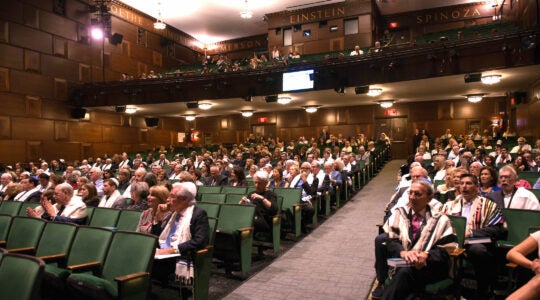When remembering,“Choose the least important day in your life. It will be important enough.” — Thornton Wilder
As the Days of Awe intensify, we enter the season of Yizkor; half of the annual memorial prayers are recited on Yom Kippur and on Sukkot’s farewell. The season begins even earlier, with many visiting graveyards, talking to the dead before Rosh HaShanah. In the graveyard there’s time to talk. Once in shul, Yizkor is solitary and swift, only 37 words for a parent. Yizkor is less for our memories, the prayer says, rather “may God remember.” It can be said in seconds; after all, the dead are on a different clock. The veil between this world and the Other World is as fleeting as a dream, and like dreams, comes and goes so fast.
Jewish Lights Publishing has issued several books in its “Prayers of Awe” series, including an encyclopedic volume on Yizkor, “May God Remember: Memory and Memorializing in Judaism,” an anthology edited by Rabbi Lawrence Hoffman, professor of liturgy and ritual at Hebrew Union College, and a regular contributor to The Jewish Week. The anthology offers more than 30 essays and historical texts, with contributors from every denomination.
“Traditionally speaking,” writes Rabbi Hoffman, “the time taken to recite the prayers in question was not great, not more than 15 minutes… but the emotional ambience of that quarter of an hour was enormous, especially because of the superstition attached to the occasion.”
The Afterlife is Jewish foundational wisdom. The first Kaddish recited after most burials explicitly states that God “will resuscitate the dead,” and speaks of “lifetimes,” as in reincarnation. But with mainstream confidence in the Afterlife dimming, congregants need encouragement. The gulf between Yizkor’s matter-of-fact text and the yearning, by some, for emotional tenderness has led to a prelude of sermons, responsive and supplemental readings, imagined conversations with the dead, along with the asking of forgiveness or us forgiving.
Hoffman notes, the almost emotionless text is given additional drama by “the commonplace practice of sending anyone whose parents [are] still alive out of the sanctuary while Yizkor was recited,” a custom rooted in the folk-fear that children who stay inside might be daring the Angel of Death to snatch a loved one, making the child’s Yizkor obligatory, not optional.
Adult mourners were sometimes encouraged to not say Yizkor at all during the first year of mourning. The reasons were partly mystical, partly because a newly widowed Jacqueline Kennedy made it fashionable to be a stoic mourner, and it was feared that the loud wailing of new mourners might be disturbing to others, more emotion than a congregation should have to endure.
Daniel Gordis, vice president of Israel’s Shalem Center, wrote in the Jerusalem Post about stepping outside during Yizkor only to have an elderly man grab him by the arm: “You’re going out for Yizkor? When we first got here after the war” — it was that war that for Jews needs no name — “there wasn’t a single person who could go out for Yizkor. Not a single one.” Everyone was a mourner. “More wars followed, more boys fell,” said the old man. “So for more years, no one could go out for Yizkor.” The elderly gentleman then pointed to the crowded courtyard outside the shul. “Ve’achshav, tistakel – kulam bahutz. (And now, look! Everyone’s outside!) This country is a miracle.”
Gordis adds, when “hope seems in short supply, I think of the perspective that he had…”
Much as Yom HaShoah developed from the ground up during the 1950s as a populist response to a liturgical vacuum, Yizkor, too, was rooted in communal trauma, rather than intended as a sentimental journey. Hoffman explains that Yizkor emerged in Germany after the Crusades and its massacres of Jews.
Yizkor was reinvigorated in the 14th century after tens of thousands of Jews were murdered by Christians who blamed Jews for the Black Death. The Yizkor idea migrated into Poland and Ukraine during the Chmielnicki massacres of 1648 (massacres that gave rise to Yizkor’s communal dirge, “El Malei Rachamim”). Yizkor itself migrated on the calendar from Yom Kippur to Passover, Shavuot and Sukkot. Because Yizkor’s impetus was the downward spiral of European Jewish history, at a time when Eastern and Western Jews had almost no contact, Yizkor cemented itself into Europe’s Ashkenaz liturgies, while Middle Eastern Sephardim developed memorial practices all their own.
With Yizkor developing in response to communal massacres, verses for individual relatives were undeveloped while communal recitations grew elaborate. Even today (as translated by the ArtScroll siddur), modern additions to Yizkor for deceased Israeli soldiers or Holocaust martyrs are highly specific. Soldiers are remembered as dying for “the People and the Land … a heroic death in missions of liberation, defense and security.” Holocaust victims are remembered for being “brutally and tortuously murdered, gassed and cremated, or buried alive, for the sanctification of your Name. Holy and pure were they all, among them scholars and saints…” But there is nothing in the Yizkor text about the relationship between parents and children.
To fill the void, official and unofficial supplemental readings became fashionable. In the anthology, author Catherine Madsen notes that supplementary Yizkor readings entered the liberal liturgy as far back as 1939, even if the early efforts, writes Madsen, were “rhapsodic” about parents “in the manner of some forgotten 19th-century novel.” A 1978 supplement, partially written by Mordecai Kaplan, founder of the Reconstructionist movement, became “a catalog of idealized family relationships,” observed Madsen, such as “the husband or wife with whom we were truly united…” But life and memories are more complicated than that, Madsen writes, with every relationship experiencing weakness and misunderstanding. She acknowledges that Yizkor “is not designed to evoke or dwell on such memories, but… loss is not diminished and mourning is not compromised by an honest look at one’s parents and their world.”
However, relationships evolve, even after death. The Jewish understanding of the Afterlife is that the dead, exposed to the spiritual illumination of the Other World, have a different consciousness than they did while alive. There’s no need to burden a soul’s new consciousness with old grievances. As Rabbi Daniel Landes, director of Jerusalem’s Pardes Institute, writes in the anthology, the mystical origins of Yizkor are rooted in an ancient Midrashic idea that once the dead “are judged on the [Heavenly] scales… even if a person has sinned [he/she] is rendered to be like a virgin.” The purification is assisted when “the living redeems the dead,” by giving charity on behalf of the deceased, the only activity for a mourner that is mentioned in Yizkor. As it says in the Book of Proverbs, “charity saves from death.”
Rabbi Shoshana Gelfand, who was chief executive of the United Kingdom’s Reform movement, adds, Yizkor “is not intended as a time to reflect on our memories accurately; rather it is designed to allow those memories to adapt.” Yizkor “encourages an evolution of that relationship as opposed to allowing it to be frozen in time.”
The limitations of public readings to satisfy everyone’s relationship has led others to see the virtues of the Yizkor prayer for a family member to be said “individually, privately and quietly,” as Rabbi Landes puts it, while the communal losses, alone, are said communally.
Rabbi Sandy Eisenberg Sasso, a Conservative rabbi in Indianapolis, writes, just as we “cannot look directly at a solar eclipse,” we are warned against directly gazing into a soul’s eclipse.
Reb Nachman used to teach his chasidim about Yodea, the Angel of Loss. (Yodea literally means “to know”.) Yodea searches for “the Lost Sparks of Creation.” The angel, writes Rabbi Sasso, is looking for all that’s lost with a small flame (similar to a yahrzeit candle lit the eve before Yizkor). Yodea looks “inside the places of unbroken darkness to find what has vanished, and they keep in memory all that has been lost.”
In these Days of Awe, the prayers tell us, nothing is forgotten. There is a Guardian of memory, and an Angel of Loss who remembers.
jonathan@jewishweek.org
The New York Jewish Week brings you the stories behind the headlines, keeping you connected to Jewish life in New York. Help sustain the reporting you trust by donating today.




